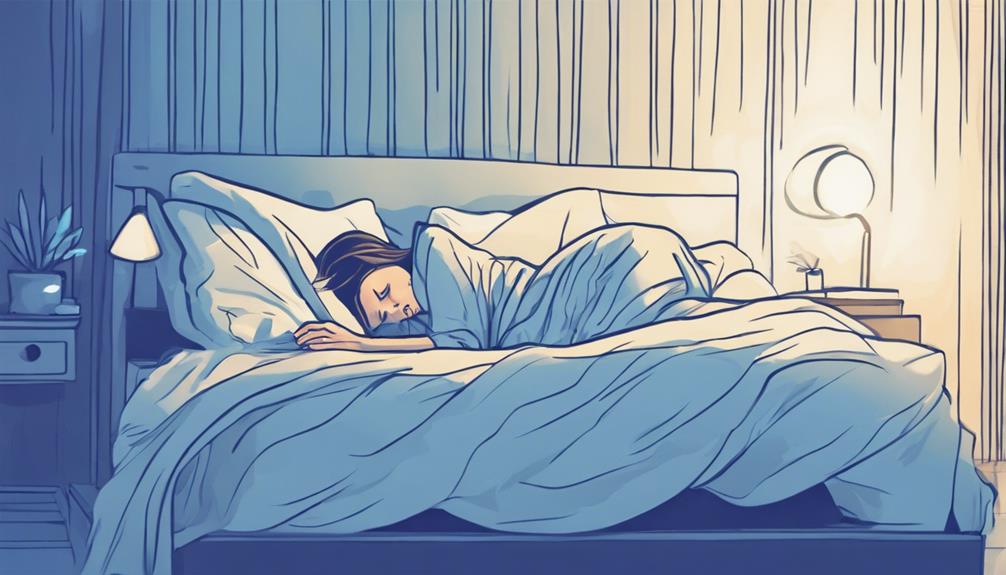Harness the potential of health hypnosis techniques to enhance your sleep quality significantly. Health hypnosis offers a unique approach to improving sleep by addressing underlying issues that may be affecting your rest. By utilizing hypnosis techniques, you can tap into the power of your mind to promote relaxation and create a conducive environment for better sleep. The integration of health hypnosis in your sleep routine holds promising benefits for achieving restful nights and overall well-being.Discover more about how health hypnosis techniques can transform your sleep quality and rejuvenate your mind and body.
Understanding Sleep Disorders

Understanding the complexities of sleep disorders requires a comprehensive examination of various factors impacting an individual's ability to achieve restful and rejuvenating sleep. Sleep disorders encompass a range of conditions that disrupt normal sleep patterns, such as sleep paralysis, sleepwalking, narcolepsy, and sleep apnea.
Sleep paralysis is a phenomenon where individuals are temporarily unable to move or speak while falling asleep or waking up. Sleepwalking involves engaging in activities typically done while awake during non-REM sleep stages.
Narcolepsy is a neurological disorder characterized by excessive daytime sleepiness and sudden onset of sleep. Sleep apnea is a condition where breathing repeatedly stops and starts during sleep, leading to fragmented and poor-quality sleep.
These disorders not only affect the quantity of sleep but also the quality, leading to daytime fatigue, cognitive impairment, and overall decreased quality of life.
Addressing Insomnia Symptoms
Individuals experiencing insomnia symptoms often face challenges in achieving restful and uninterrupted sleep, impacting their overall well-being and daily functioning. Insomnia, characterized by difficulty falling asleep, staying asleep, or waking up too early, can lead to feelings of fatigue, irritability, and difficulty concentrating during the day.
One effective approach to addressing insomnia symptoms is incorporating relaxation techniques and deep breathing exercises into a bedtime routine. These techniques can help calm the mind and body, making it easier to transition into a state of relaxation conducive to sleep.
Deep breathing exercises, such as diaphragmatic breathing or progressive muscle relaxation, can reduce physiological arousal and promote a sense of calmness before bedtime.
Research has shown that practicing relaxation techniques and deep breathing exercises can improve sleep quality and help individuals fall asleep faster. By integrating these strategies into a nightly routine, individuals experiencing insomnia symptoms may find relief and experience more restful nights of sleep.
Managing Restless Leg Syndrome

Managing Restless Leg Syndrome can greatly impact the quality of sleep and overall well-being for individuals experiencing this condition. Restless Leg Syndrome (RLS) is characterized by uncomfortable sensations in the legs, often leading to an irresistible urge to move them, making it challenging to relax and fall asleep.
To help manage RLS symptoms and improve sleep quality, individuals can consider incorporating relaxation techniques and movement therapy into their daily routine. Techniques such as progressive muscle relaxation, deep breathing exercises, and gentle stretching can help alleviate discomfort and promote relaxation before bedtime.
In addition to non-pharmacological approaches, medication options prescribed by healthcare professionals may be considered for severe cases of RLS. Lifestyle changes, such as maintaining a consistent sleep schedule, regular exercise, and avoiding caffeine and alcohol close to bedtime, can also play a significant role in managing RLS symptoms.
Alleviating Nightmares and Night Terrors
Addressing nightmares and night terrors can significantly enhance the quality of sleep and overall mental well-being for individuals experiencing these distressing sleep disturbances. Nightmares are vivid, frightening dreams that can cause feelings of fear, terror, and anxiety, often leading to disrupted sleep patterns and daytime distress.
Night terrors, on the other hand, are episodes of intense fear or dread during sleep, accompanied by physical symptoms such as screaming, flailing, or rapid heart rate.
In alleviating nightmares and night terrors, health hypnosis techniques can play a crucial role. Through trauma healing approaches, hypnosis can help individuals process and heal from past traumas that may be contributing to their distressing dreams.
Dream analysis within a therapeutic setting can also provide valuable insights into the underlying causes of nightmares and night terrors, enabling individuals to confront and resolve the issues at hand.
Improving Sleep Patterns

Improving sleep patterns is fundamental to promoting overall well-being and mental health, encompassing a range of strategies to enhance the quality and duration of restorative sleep.
Incorporating relaxation techniques into bedtime routines, such as deep breathing exercises, progressive muscle relaxation, or gentle stretching, can help calm the mind and body, facilitating a smoother transition into sleep.
Additionally, mindfulness practices, like meditation or guided imagery, can alleviate racing thoughts and promote a state of relaxation conducive to falling asleep.
Research suggests that these techniques can improve sleep efficiency and reduce the time it takes to fall asleep. By incorporating these practices consistently, individuals may experience more restful and rejuvenating sleep, leading to enhanced daytime functioning and improved overall health.
It's important to note that the effectiveness of these strategies may vary among individuals, so it's beneficial to experiment with different techniques to find what works best for each person.
Ultimately, prioritizing healthy sleep patterns can have a profound impact on one's quality of life.
Combating Sleep Anxiety
How can individuals effectively deal with the challenges of sleep anxiety to promote better rest?
Sleep anxiety can significantly impact the quality of rest, leading to difficulties falling asleep or staying asleep throughout the night. To combat sleep anxiety, incorporating relaxation techniques and stress reduction strategies into your bedtime routine can be highly beneficial. Techniques such as deep breathing exercises, progressive muscle relaxation, mindfulness meditation, or gentle yoga can help calm the mind and body before sleep. These practices can reduce the physiological and psychological arousal associated with anxiety, making it easier to drift off into a peaceful slumber.
Moreover, developing a consistent pre-sleep routine that focuses on relaxation can signal to the brain that it is time to unwind and prepare for rest. By creating a soothing environment, free of distractions and stressors, individuals can cultivate a sense of calm that promotes better sleep quality and overall well-being.
Prioritizing stress management throughout the day through activities like exercise, journaling, or talking to a therapist can also contribute to reducing sleep anxiety and improving sleep patterns.
Enhancing Sleep Environment

Creating a conducive sleep environment is essential for promoting optimal rest and enhancing overall sleep quality. One fundamental aspect of enhancing the sleep environment is practicing good sleep hygiene. This includes maintaining a comfortable room temperature, ensuring minimal noise and light disturbances, and establishing a regular sleep schedule.
By adhering to these practices, individuals can signal to their bodies that it is time to rest, facilitating the onset of sleep.
In addition to sleep hygiene, incorporating relaxation techniques into the sleep environment can further improve sleep quality. Techniques such as deep breathing exercises, progressive muscle relaxation, or guided imagery can help calm the mind and body before bedtime.
Adopting Healthy Sleep Habits
To optimize sleep quality, establishing and maintaining healthy sleep habits is crucial for overall well-being and cognitive function. Sleep hygiene plays a fundamental role in promoting restful sleep. This includes maintaining a consistent sleep schedule, creating a comfortable sleep environment, and limiting exposure to screens before bedtime.
Incorporating relaxation techniques, such as deep breathing exercises or progressive muscle relaxation, can help calm the mind and body before sleep.
Mindfulness and meditation practices are also effective tools for improving sleep quality. Mindfulness involves focusing on the present moment without judgment, which can reduce stress and anxiety that often interfere with sleep. Meditation practices, like guided imagery or body scan meditation, can help induce relaxation and prepare the body for rest.
Incorporating these healthy sleep habits into your nightly routine can lead to improved sleep quality and overall well-being. By prioritizing sleep hygiene and incorporating relaxation techniques like mindfulness and meditation, you can set the stage for a restful and rejuvenating night's sleep.
Frequently Asked Questions
Can Health Hypnosis Techniques Cure Sleep Disorders Completely?
Hypnosis effectiveness in addressing sleep disorders varies among individuals. While it may improve sleep quality for some, complete cure isn't guaranteed. Safety concerns, especially for children, must be considered. Consultation with a healthcare provider is advised.
Is Hypnosis Safe for Treating Insomnia in Children?
Hypnosis can be safe for treating insomnia in children when conducted by a qualified professional. Child safety is paramount, requiring parental involvement and oversight throughout the process to ensure the well-being and appropriateness of the treatment.
How Long Does It Take to See Results With Hypnosis for Nightmares?
Hypnosis effectiveness in managing nightmares can vary depending on individual factors. Typically, some individuals may experience positive changes within a few sessions, while others might require more time for noticeable improvements.
Can Hypnosis Help With Sleepwalking Episodes?
Hypnosis has shown promise in managing sleepwalking episodes by addressing underlying triggers and promoting relaxation. Research suggests that hypnosis can be effective in sleepwalking prevention by helping individuals gain better control over their subconscious behaviors.
Are Health Hypnosis Techniques Effective for Shift Workers With Sleep Issues?
For night shift workers experiencing sleep issues, health hypnosis techniques can aid in regulating circadian rhythms and improving sleep quality. Research suggests hypnosis may enhance performance by addressing sleep challenges unique to night schedules.
Conclusion
In conclusion, the use of health hypnosis techniques can effectively enhance sleep quality by addressing various sleep disorders such as insomnia, restless leg syndrome, nightmares, and night terrors.
By improving sleep patterns, managing sleep anxiety, creating a conducive sleep environment, and adopting healthy sleep habits, individuals can experience a significant improvement in their overall sleep quality.
These evidence-based practices offer a promising approach to achieving better sleep outcomes.
